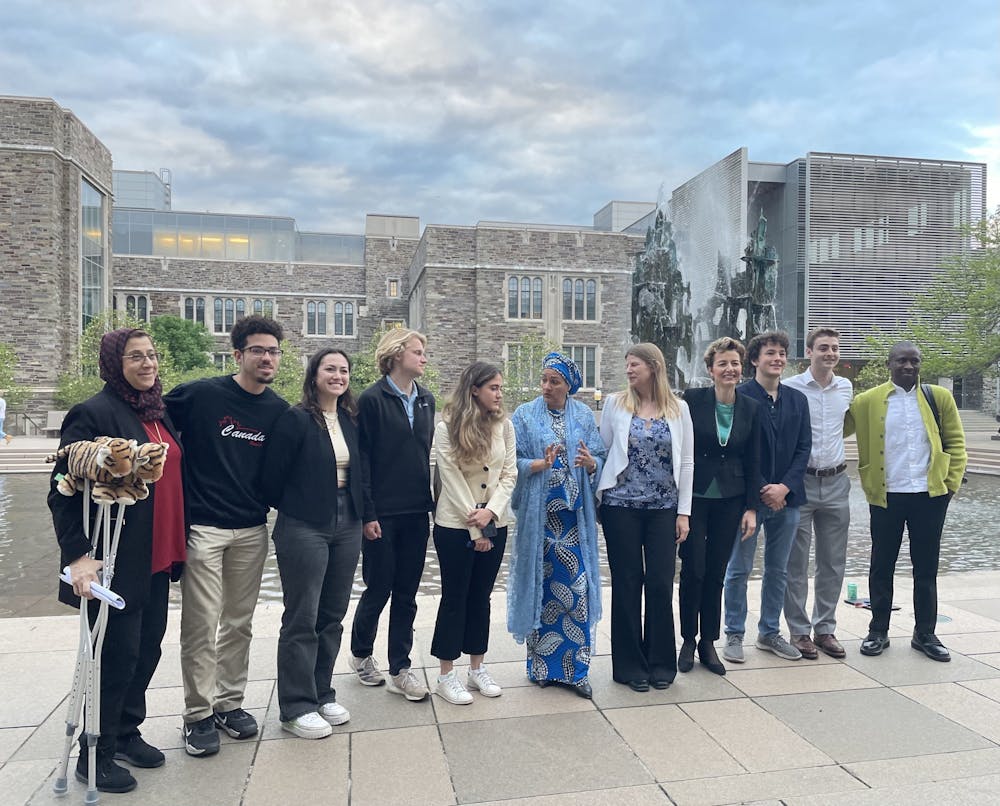“One thing that we did was to kick power in the shins,” said Her Excellency Amina Mohammed, Deputy Secretary-General of the United Nations (UN) at a School of Public and International Affairs (SPIA) event held on Monday, April 17.
Mohammed was referring to the process of developing the 17 Sustainable Development Goals (SDGs), an agenda adopted by the UN in 2015 that aims to “transform our world,” and “ensure that all people enjoy health, justice, and prosperity,” according to the World Health Organization. At the time, Mohammed served as Special Adviser to former Secretary-General Ban Ki-moon and has been called a “key player” in post-2015 development planning.
Recent events from SPIA have highlighted experts on policy challenges from diverse backgrounds. Recent spotlighted events have included an April 19 event with Desirée Cormier Smith, the US State Department Special Representative for Racial Equity and Justice; an April 11 event with Elayne G. Whyte, the first person of African descent to be the Vice-Minister of Foreign Affairs of Costa Rica; and a March 30 conversation with Zahid Nisar Quraishi, the first Muslim-American to serve on a federal district court.
As Deputy Secretary-General of the UN, Mohammed is a top official in one of the world’s most powerful organizations, and among the most influential people to visit Princeton this year. In her career, Mohammed has also worked to increase access to education, prevent climate change, and reduce poverty. She served as Minister of Environment of the Federal Republic of Nigeria and led the discussion and implementation of the 2030 Agenda for Sustainable Development and the creation of the Sustainable Development Goals in 2015.
Over 100 University students and faculty were in attendance at Monday’s panel, which specifically addressed the importance of multilateralism and the consequences of unequal power dynamics between countries and leaders on sustainable development. Multilateralism refers to the alliance of several countries in pursuit of a common, international objective, such as the UN.
Mohammed explained that the process of writing the SDGs took over four years and ended in a comprehensive set of objectives, resulting in the “odd number” of 17. Mohammed attributed this to the UN’s intention to incorporate the voices of “everyone in the room” who expressed concerns about issues that ranged from injustice to lack of access to public goods.
“When we were designing the sustainable development goals and we said ‘leave no one behind,’ I thought ‘what does that really mean,’” Mohammed said. “Let me go to the smallest member of our family and see what that looks like from the ground.”
The first six goals deal with basic human rights, the seventh through fifteenth relate to more specific issues, and the sixteenth and seventeenth provide guidance for institutions.

Mohammed shared that she believes SDGs provide an important framework, allowing all parties to “come to the table,” and she said hopefully “no one argues.”
Still, Mohammed discussed how the ongoing war in Ukraine showed inequalities in health, financial stability, access to resources, and women’s and children’s rights, in addition to revealing issues with the UN’s capacity to react quickly to emergency situations.
“The aftershocks on the cost of living, on energy, on debt because of inflation in Europe and therefore the interest rate of debt you never expect to pay back,” Mohammed said. “That put everyone in crisis in the developing world.”
Mohammed questioned, “Was there a response? Is there a response?”

Mohammed presented these challenges as ones the UN seeks to address; however, she also recognized that for sustainable development to come to fruition, countries and global organizations must adapt public policy internally.
“Are we worse off since 2015?” Mohammed asked. “Yes, the geopolitical tensions have created an environment where it’s very difficult for us to see that there is an equal world in access and means of implementation for the SDGs.”
“We need to do a lot harder work,” Mohammed said. “The minute we said sustainable development we knew we were going to be lifting something much heavier. We knew we were going to be changing the status quo.”
SPIA Dean Amaney Jamal moderated the event, which was held in Richardson Auditorium.
Rebecca Cunningham is an assistant News editor for the ‘Prince.’
Please send any corrections to corrections[at]dailyprincetonian.com.








